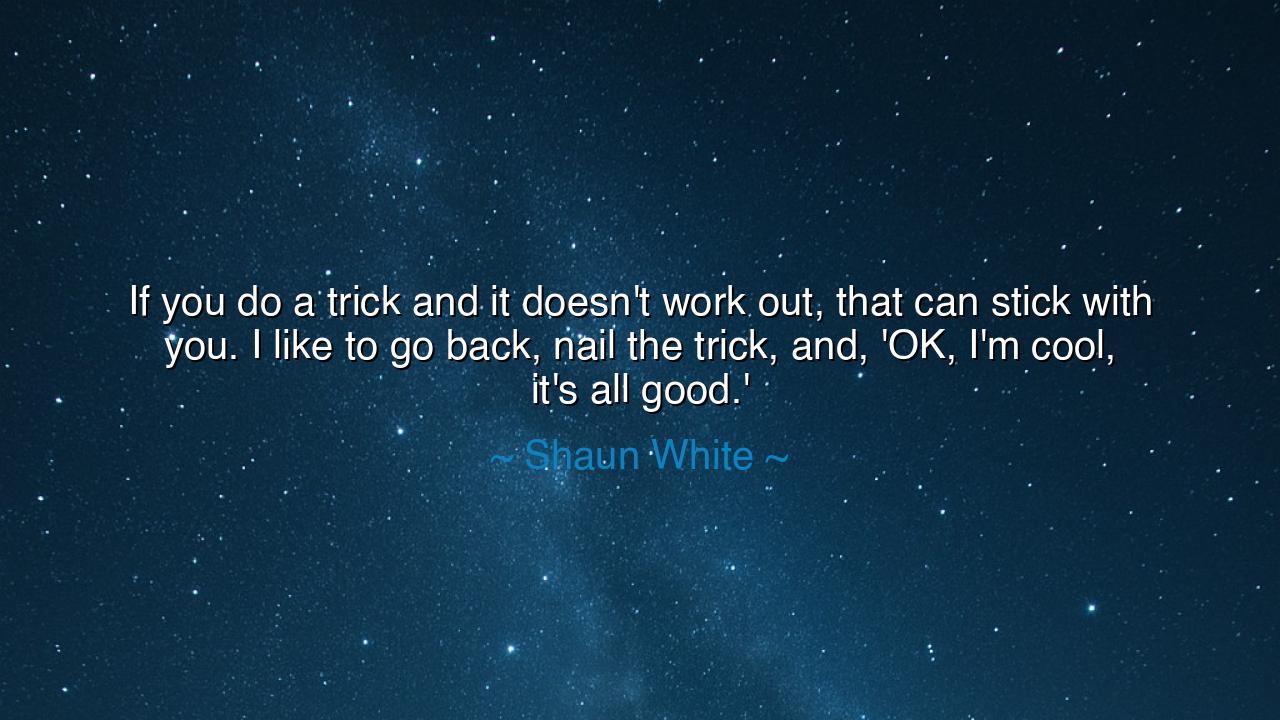
If you do a trick and it doesn't work out, that can stick with
If you do a trick and it doesn't work out, that can stick with you. I like to go back, nail the trick, and, 'OK, I'm cool, it's all good.'






In the pursuit of mastery, there is a lesson that all great achievers must learn: failure is not the end but a necessary part of the journey. Shaun White’s words, "If you do a trick and it doesn't work out, that can stick with you. I like to go back, nail the trick, and, 'OK, I'm cool, it's all good,'" speak to the power of resilience and the importance of overcoming failure. The feeling of falling short, of not achieving what we set out to do, is a burden that can weigh heavily on the heart. Yet, true greatness lies not in avoiding failure, but in the ability to rise from it, to try again, and to prove to oneself that success is not defined by a single misstep but by the perseverance to keep moving forward.
In the ancient world, great warriors and philosophers understood that victory was never guaranteed, and that the true measure of strength came in how one responded to defeat. Take the example of Alexander the Great, who, as a young ruler, faced several setbacks in his campaigns. Though he was often victorious, there were moments where his strategy failed or where he faced unexpected losses. Yet, Alexander, like White, did not let these failures define him. Instead, he learned from them, adapted, and returned with a new resolve. His ability to rise after each setback, to return to the battlefield with renewed confidence, was what ultimately led to his greatness. Alexander’s journey is a reminder that to be truly heroic, one must first face failure, learn from it, and continue the struggle.
The path to greatness is also reflected in the lives of the ancient philosophers. Consider Socrates, who was condemned to death for his beliefs. Despite this failure in the eyes of society, Socrates maintained his philosophical integrity, remaining true to his pursuit of truth and wisdom. His life teaches us that while external failures may seem insurmountable, it is the inner strength to stay true to one’s purpose that defines a person’s legacy. Socrates did not bow to fear or shame after his condemnation; instead, he embraced his fate, knowing that the true victory lay in the pursuit of wisdom, not in avoiding the inevitable moments of defeat.
In the modern world, the wisdom of resilience continues to be relevant. Take the story of Michael Jordan, often considered the greatest basketball player of all time. Jordan’s path to success was filled with failures—from being cut from his high school basketball team to experiencing playoff defeats. Yet, it was his determination to rise above these moments, to practice and perfect his game, that set him apart. Jordan famously said, “I’ve missed more than 9,000 shots in my career. I’ve lost almost 300 games. Twenty-six times I’ve been trusted to take the game-winning shot and missed.” His ability to accept these setbacks, learn from them, and return with a stronger will is the very essence of the lesson that White shares: success is not about avoiding failure, but about embracing the lessons it offers.
The true meaning of White’s statement is rooted in the concept of inner mastery—the ability to recognize that failure is a natural part of the journey, and that it is temporary. Every setback, every trick that doesn’t work, is but a stepping stone toward mastery. It is in the rebounds, the retries, that we find our true strength. To fail and not be broken by it is the mark of a warrior, an artist, or an athlete who understands the cyclical nature of progress. When White says, “I like to go back, nail the trick,” he speaks not just of a physical act but of the mental resolve required to face the fear of failure and turn it into the satisfaction of achievement.
The lesson here is clear: we are all human, and failure is not an exception to our journey, but an inevitable part of it. The true measure of success lies in how we respond to these moments. Will we let them define us, or will we rise again with strength, wisdom, and a renewed sense of purpose? To live fully is to embrace failure as a necessary teacher, to return to the task at hand with grace, and to understand that each fall is not an end but a call to persevere.
In practical terms, when faced with failure, do not let it hold you back or define your journey. Instead, like White, return to the task with renewed resolve and confidence. Whether in your career, relationships, or personal development, understand that mistakes are part of the process, not the destination. Learn from them, adapt, and rise to meet the next challenge with wisdom. Embrace the failures, and let them become the foundation upon which your future successes are built. In doing so, you will discover that true victory is not in never falling, but in rising every time you do.






AAdministratorAdministrator
Welcome, honored guests. Please leave a comment, we will respond soon